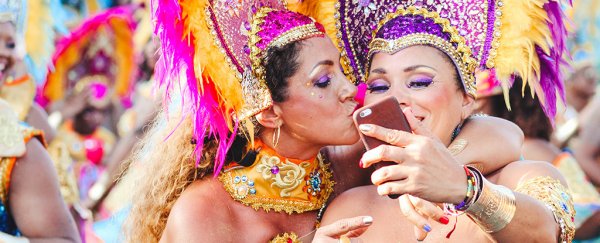Is our non-stop photo-taking pulling us out of the moments that matter and causing us to forget what we've seen? Maybe not, according to new research looking at the relationship between snapping pictures and forming memories.
During the study, 294 volunteers were asked to tour a museum exhibit listening to an audio guide – those in one group were encouraged to take photos, while those in another had to leave their phones and cameras behind.
When questioned afterwards, the photo takers could remember more about what they'd seen and less about what they'd heard. The result suggests the act of taking pictures and seeking out worthy frames to capture helps fix memories in our minds, according to the researchers.
"Our research is novel because it shows that photo-taking itself improves memory for visual aspects of an experience but can hurt memory for non-visual aspects, like auditory details," said the team, from New York University, University of Southern California, University of Pennsylvania and Yale University, in a statement.
The findings could help scientists understand more about how smartphone use and constant photo-taking is affecting our memories and the way we process information.
While there is some evidence that our brains are using smartphone snaps and the internet as replacements for our long-term memories, that might not apply when we're taking photos of people and places that we really don't want to forget.
this is my new favorite photo of all time pic.twitter.com/v8Qs6TeXZf
— Wayne Dahlberg (@waynedahlberg) September 26, 2015
"People take photos specifically to remember these experiences, whether it's a fun dinner with friends, a sightseeing tour, or something else," say the researchers.
The museum test was backed up with a follow-up experiment using a virtual art gallery app on a smartphone. Some volunteers could take screenshots and some couldn't, and the same pattern was repeated – those who grabbed digital memories remembered more of what they'd seen, but less of what they'd heard from an audio commentary.
The positive effect on visual memory was greater than the negative effect on auditory memory, the researchers found.
Even when participants were only asked to take a mental photo, the same boost to memory was noticed, though the difference wasn't as significant. What's more, in both experiments those who could snap photos were also more likely to remember objects they hadn't specifically taken pictures of as well as ones they had.
"These findings suggest that having a camera changes how people approach an experience in a fundamental way," says the team.
"Even when people don't take a photo of a particular object, like a sculpture, but have a camera with them and the intention to take photos, they remember that sculpture better than people who did not have a camera with them."
What's also interesting is that the study participants weren't allowed to review their photos before taking memory tests, which mimics what we tend to do in real life – taking a pile of photos of everything we see before never looking at them again.
It's almost as if the potential to take photos makes us more aware of our surroundings.
Remember that human beings have only been able to capture moments in time in the form of photographs for less than 200 years, and the researchers suggest we've still got a lot to learn about the effects of photography on human behaviour.
With the rise of digital photography and then smartphones, taking pictures and sharing them with millions of other people is now instant and effortless – and we still don't know exactly how that's affecting our take on life.
"Given the increasing centrality of photography in people's lives, addressing these open questions will be both theoretically interesting and relevant to people's lives," conclude the researchers in their published paper.
The research has been published in Psychological Science.
